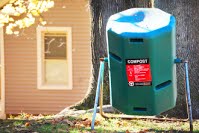
c/o sites.google.com/a/wesleyan.edu/wescompost/
The COVID-19 pandemic has interrupted many aspects of campus life that University students took for granted, and sustainability is no exception. The University’s composting program, in particular, has had to reorient itself since the fall to attempt to balance environmental and public health concerns. While composting is still happening on campus, its scale has shrunk due to the pandemic.
At the beginning of the year, University dining provider Bon Appetit reimagined its waste management system in order to minimize the spread of COVID-19. As Eco Facilitator Gaelin Kingston ’22 explained, Bon Appetit made the decision to use single-use to-go items when it was still uncertain how likely it was to become infected from touching a contaminated surface.
“The pandemic has just greatly changed the nature of waste and waste disposal at Wesleyan, and this has had rippling effects both onto Bon Appetit and onto the sustainability department,” Kingston said. “Their number-one priority basically was to protect students [and] protect staff.”
Bon Appetit worked with the University over the summer to find a solution that would keep campus safe while also minimizing plastic use. The re-introduction of plastic onto campus this year left many students confused about which items are or are not compostable. After the fall semester, the group that the University contracts to collect the compost informed the University that due to contamination from plastic materials, composting of student-generated waste from Usdan would be suspended for the spring semester.
“There was a huge uptick in contamination in our composting due to things like [plastic] silverware and condiments,” Kingston said. “When there’s a high enough percentage of non-compostable material in the compost, the hauler can no longer accept that compost because it impacts their profit margins in that they spend [more] time sorting or throwing stuff out.”
According to Director of Usdan Administrations and Operations Michelle Myers-Brown, the hauler made this decision unilaterally.
“As far as composting, that was not a decision we were consulted on,” Myers-Brown wrote in an email to The Argus “Bon Appetit has continued with pre-consumer composting throughout the year since that is a decision we were able to control.”
This pre-consumer composting is referred to as “back-end” composting and takes the unused food discarded during meal preparation. While Usdan’s green “front-end” composting bins, where students can discard their food waste after meals, are out-of-service, composting is still happening at most locations on campus, including the black bins in residential areas. Ensuring that students actually know that composting is still possible, however, has been another matter.
“Everything’s kind of up in the air, and there’s so much stuff going on, and it’s kind of difficult to create a behavioral change campaign.” said Kingston.
While Bon Appetit reportedly considered purchasing compostable cutlery rather than stopping front-end composting at Usdan entirely, they opted for plastic cutlery instead.
“The University could provide only compostable material,” said Kingston. “One problem with that is that the compostable silverware costs a lot more. I think that with COVID and everything like that, money has been tighter.”
University Sustainability Director Jen Kleindienst echoed this sentiment.
“To my knowledge, Bon Appetit purchases all compostables except the cutlery kits because of cost this year,” Kleindienst wrote.
The Argus was unable to reach Bon Appetit for comment at the time of publication.
Despite these difficulties, the Sustainability Office made a concentrated effort to keep the University as environmentally friendly as possible while still prioritizing the safety of students and workers. The Green Fund also purchased reusable cutlery for students in an attempt to combat plastic use on campus.
“We’re continuing that push right now,” said Kingston. “But we haven’t been able to exactly measure how effective that’s been in terms of getting people to actually reuse them. We know we’ve got them into their hands, but that doesn’t necessarily mean that they’re actually using them.”
Sustainability Office Compost Intern Mia Sakamoto ’22 says that the Sustainability Office has also been trying to maintain awareness on campus of environmental issues. But, like all events on campus, COVID has made this difficult.
“We usually have more events related to composting and sustainability, like decorating compost lids or documentary series about food waste,” Sakamoto said. “We’re trying to make these interactions all through Zoom but it’s been very complicated.”
With the school year coming to a close, the Sustainability Office is shifting its focus to the next academic year.
“We’ve kind of been on the back foot for [the] majority of this pandemic,” she said. “It’s looking like we might be better served putting our efforts towards hitting the ground running in the fall and making sure that we can get all of our compost accepted.”
Hannah Docter-Loeb contributed reporting.
Kay Perkins can be reached at kperkins@wesleyan.edu